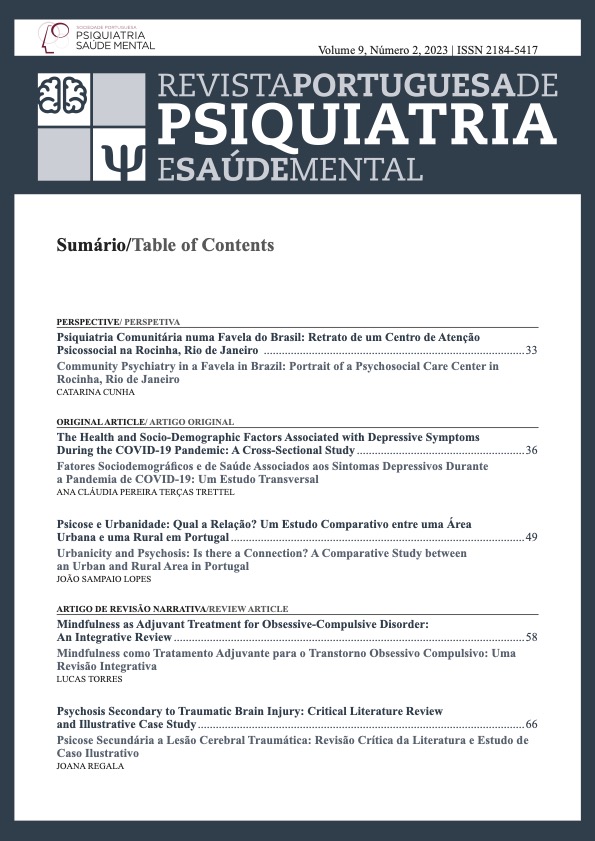Mindfulness as Adjuvant Treatment for Obsessive‐Compulsive Disorder: An Integrative Review
DOI:
https://doi.org/10.51338/rppsm.290Keywords:
Cognitive Behavioral Therapy, Mindfulness, Obsessive‐Compulsive Disorder/therapy, Treatment OutcomeAbstract
Obsessive‐compulsive disorder is characterized by the presence of obsessions and/or compulsions. Standard treatment, although effective in improving symptoms, in more severe cases may not be sufficient. The objective of this study
was to identify in the literature data on the effectiveness of Mindfulness as a complementary treatment in reducing symptoms in patients with obsessive‐compulsive disorder. This integrative review was performed in Medline, Lilacs, Embase, Cochrane, CINAHL, and Web of Science databases. A total of 135 results were found, of which only 11 articles were used after applying the duplicate exclusion and eligibility criteria. Thus, we identified that mindfulness ‐based cognitive therapy (MBCT) when compared to more traditional treatments, such as cognitive‐behavioral therapy, showed promise, especially in improving self‐awareness regarding the symptoms of the disorder. However, studies with longer exposure time and with more specific variables need to be designed to verify the longterm efficacy of MBCT, especially in more severe and older patients.
Downloads
References
Rosário-Campos MC do, Mercadante MT. Transtorno obsessivo-compulsivo. Rev Bras Psiquiatr. 2000; 22 (supl 2): 16–9. https://doi.org/10.1590/S1516-44462000000600005.
Torres AR, Smaira SI. Quadro clínico do transtorno obsessivo-compulsivo. Rev Bras Psiquiatr. 2001;23(suppl 2):6–9. https://doi.org/10.1590/S1516-44462001000600003.
Scholl CC, Tabeleão VP, Stigger RS, Trettim JP, Mattos MB de, Pires AJ, et al. Qualidade de vida no Transtorno Obsessivo-Compulsivo: um estudo com usuários da Atenção Básica. Ciênc saúde coletiva. 2017;22(4):1353–60. https://doi.org/10.1590/1413-81232017224.02062015
Silva D, Silva DRS da, Alencar ET da S, Dias E da S, Menezes FG de. Transtorno obsessivo-compulsivo (TOC): características, classificação, sintomas e tratamento. Consc. Saúde. 2008;6(2):351–60. https://doi.org/10.5585/conssaude.v6i2.1161
Cludius B, Landmann S, Rose N, Heidenreich T, Hottenrott B, Schröder J, et al. Long-term effects of mindfulness-based cognitive therapy in patients with obsessive-compulsive disorder and residual symptoms after cognitive behavioral therapy: Twelve-month follow-up of a randomized controlled trial. Psychiatry Research. 2020; 291:113119. https://doi.org/10.1016/j.psychres.2020.113119
Williams JMG, Alatiq Y, Crane C, Barnhofer T, Fennell MJV, Duggan DS, et al. Mindfulness-based Cognitive Therapy (Mbct) in bipolar disorder: Preliminary evaluation of immediate effects on between-episode functioning. Journal of Affective Disorders. abril de 2008;107(1–3):275–9. https://doi.org/10.1016/j.jad.2007.08.022
Botelho LLR, Cunha CC de A, Macedo M. O método da revisão integrativa nos estudos organizacionais. GeS. 2011; 5(11):121. https://doi.org/10.21171/ges.v5i11.1220
Moher D, Liberati A, Tetzlaff J, Altman DG, The PRISMA Group.Principais itens para relatar Revisões sistemáticas e Meta-análises: A recomendação PRISMA. Epidemiol Serv Saúde. 2015; 24(2):335–42. http://dx.doi.org/10.5123/s1679-49742015000200017.
Souza MT de, Silva MD da, Carvalho R de. Integrative review: what is it? How to do it? Einstein (São Paulo). 2010; 8(1):102–6. https://doi.org/10.1590/S1679-45082010RW1134
Santos CM da C, Pimenta CA de M, Nobre MRC. The PICO strategy for the research question construction and evidence search. Rev Latino-Am Enfermagem. junho de 2007;15(3):508–11. https://doi.org/10.1590/S0104-11692007000300023
Oxford. Oxford Center for Evidence-Based Medicine: levels of evidence. Levels of Evidence. 2009. https://www.cebm.ox.ac.uk/resources/levels-of-evidence/oxford-centre-for-evidence-based-medicine-levels-of-evidence-march-2009.
Hertenstein E, Rose N, Voderholzer U, Heidenreich T, Nissen C, Thiel N, et al. Mindfulness-based cognitive therapy in obsessive-compulsive disorder – A qualitative study on patients’ experiences. BMC Psychiatry. 2012;12(1):185. https://doi.org/10.1186/1471-244X-12-185
Kumar A, Sharma M, Narayanaswamy J, Kandavel T, Janardhan Reddy Y. Efficacy of mindfulness-integrated cognitive behavior therapy in patients with predominant obsessions. Indian J Psychiatry. 2016;58(4):366. https://doi.org/10.4103/0019-5545.196723
Key BL, Rowa K, Bieling P, McCabe R, Pawluk EJ. Mindfulness-based cognitive therapy as an augmentation treatment for obsessive-compulsive disorder. Clin Psychol Psychother. setembro de 2017;24(5):1109–20. https://doi.org/10.1002/cpp.2076
Didonna F, Lanfredi M, Xodo E, Ferrari C, Rossi R, Pedrini L. Mindfulness-based cognitive therapy for obsessive-compulsive disorder: a pilot study. Journal of Psychiatric Practice. 2019;25(2):156–70. https://doi.org/10.1097/PRA.0000000000000377
Landmann S, Cludius B, Tuschen-Caffier B, Moritz S, Külz AK. Changes in the daily life experience of patients with obsessive-compulsive disorder following mindfulness-based cognitive therapy: Looking beyond symptom reduction using ecological momentary assessment. Psychiatry Res. 2020; 286:112842. https://doi.org/10.1016/j.psychres.2020.112842
Gasnier M, Pelissolo A, Bondolfi G, Pelissolo S, Tomba M, Mallet L, et al. Les interventions basées sur la pleine conscience dans le trouble obsessionnel compulsif : mécanismes d’action et présentation d’une étude pilote. L’Encéphale. 2017; 43(6):594–9. https://doi.org/10.1016/j.encep.2016.10.004
Crowe K, McKay D. Mindfulness, obsessive–compulsive symptoms, and executive dysfunction. Cogn Ther Res. 2016; 40(5):627–44. https://doi.org/10.1007/s10608-016-9777-x
Williams JMG, Russell I, Russell D. Mindfulness-based cognitive therapy: Further issues in current evidence and future research. Journal of Consulting and Clinical Psychology. 2008;76(3):524–9. https://doi.org/10.1037/0022-006X.76.3.524
Külz AK, Landmann S, Cludius B, Rose N, Heidenreich T, Jelinek L, et al. Mindfulness-based cognitive therapy (Mbct) in patients with obsessive–compulsive disorder (Ocd) and residual symptoms after cognitive behavioral therapy (Cbt): a randomized controlled trial. Eur Arch Psychiatry Clin Neurosci. março de 2019;269(2):223–33. https://doi.org/10.1007/s00406-018-0957-4
Rupp C, Gühne D, Falke C, Doebler P, Andor F, Buhlmann U. Comparing effects of detached mindfulness and cognitive restructuring in obsessive‐compulsive disorder using ecological momentary assessment. Clin Psychol Psychother. março de 2020;27(2):193–202. https://doi.org/10.1002/cpp.2418.
Marcks BA, Woods DW. A comparison of thought suppression to an acceptance-based technique in the management of personal intrusive thoughts: a controlled evaluation. Behaviour Research and Therapy. 2005; 43(4):433–45. https://doi.org/10.1016/j.brat.2004.03.005.
Hofmann SG, Sawyer AT, Witt AA, Oh D. The effect of mindfulness-based therapy on anxiety and depression: A meta-analytic review. Journal of Consulting and Clinical Psychology. 2010;78(2):169–83. https://doi.org/10.1037/a0018555
Van Dam NT, Sheppard SC, Forsyth JP, Earleywine M. Self-compassion is a better predictor than mindfulness of symptom severity and quality of life in mixed anxiety and depression. Journal of Anxiety Disorders. 2011; 25(1):123–30. https://doi.org/10.1016/j.janxdis.2010.08.011
Strege MV, Swain D, Bochicchio L, Valdespino A, Richey JA. A pilot study of the effects of mindfulness-based cognitive therapy on positive affect and social anxiety symptoms. Front Psychol. 2018;9:866. https://doi.org/10.3389/fpsyg.2018.00866
Garland EL, Geschwind N, Peeters F, Wichers M. Mindfulness training promotes upward spirals of positive affect and cognition: multilevel and autoregressive latent trajectory modeling analyses. Front Psychol, p.6. https://doi.org/10.3389/fpsyg.2015.00015.








